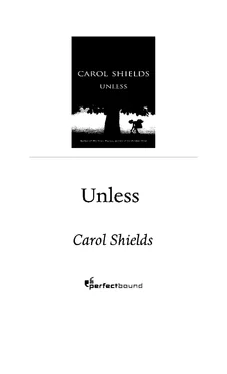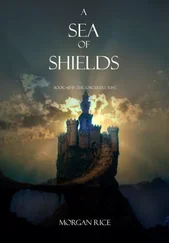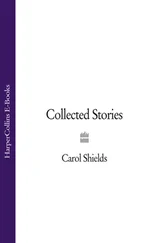Carol Shields - Unless
Здесь есть возможность читать онлайн «Carol Shields - Unless» — ознакомительный отрывок электронной книги совершенно бесплатно, а после прочтения отрывка купить полную версию. В некоторых случаях можно слушать аудио, скачать через торрент в формате fb2 и присутствует краткое содержание. Жанр: Современная проза, на английском языке. Описание произведения, (предисловие) а так же отзывы посетителей доступны на портале библиотеки ЛибКат.
- Название:Unless
- Автор:
- Жанр:
- Год:неизвестен
- ISBN:нет данных
- Рейтинг книги:4 / 5. Голосов: 1
-
Избранное:Добавить в избранное
- Отзывы:
-
Ваша оценка:
- 80
- 1
- 2
- 3
- 4
- 5
Unless: краткое содержание, описание и аннотация
Предлагаем к чтению аннотацию, описание, краткое содержание или предисловие (зависит от того, что написал сам автор книги «Unless»). Если вы не нашли необходимую информацию о книге — напишите в комментариях, мы постараемся отыскать её.
Unless — читать онлайн ознакомительный отрывок
Ниже представлен текст книги, разбитый по страницам. Система сохранения места последней прочитанной страницы, позволяет с удобством читать онлайн бесплатно книгу «Unless», без необходимости каждый раз заново искать на чём Вы остановились. Поставьте закладку, и сможете в любой момент перейти на страницу, на которой закончили чтение.
Интервал:
Закладка:
There the two of them catch the bus into Toronto, disembarking at the old bus station downtown. From there they walk a block to catch the subway to Bloor and Bathurst and they spend the day with Norah on her patch of sidewalk in downtown Toronto, returning to Orangetown in the late afternoon. They’ve been doing this since we first found out where she was.
The first time, they went without telling us. We were worried to have them gone all day, never mind that they were in their teens. We insisted on an explanation. They were embarrassed, reluctant. “We just sort of thought we’d go see her,” Chris said finally.
They take mats to sit on. And blankets, now that the weather’s turned. They pack sandwiches, bottles of water, a thermos of tea, a stack of magazines and books, toilet paper and tampons; they’ve thought of everything. They’ve ransacked Norah’s dresser drawers for socks, underwear, sweaters. They’re dying to take Pet, but he’s not allowed on the bus.
They’re convinced that one look at Pet — slobbering and sniffing and wagging his tail — would bring her home. Tom and I are hesitant; we worry about putting pressure on her, about blackmail.
Neither one of us is clear about what the girls do at Bloor and Bathurst for all those long hours. We’ve only had hints.
“We just hang out,” Natalie says.
“We’re like visitors,” says Chris.
I hold my tongue. To ask too much might unsettle the exceedingly fragile arrangements they’ve worked out.
Passivity has the capacity to arouse violence, and this is what I worry about mostly, that Norah will not be able to defend herself. I’m deluded enough to believe that Chris’s and Natalie’s Saturday excursions help to keep her safe, though at a risk to their own safety. I go along with it, the Saturday visitations, and wave the girls off for the day blithely, as though this new routine might succeed, actually rescuing a portion of what’s been lost.
The first time they went they threw their arms around her and pleaded and cried.
“She smiled at us,” Chris reported. “Just sat there and smiled horribly and said she was happy to see us.”
“She stank,” Natalie said another time. “Kronk City. They do have showers at the hostel.
You’d think she’d remember how to use a shower.”
“She doesn’t stink,” Chris said, anxious to reassure me. “It’s just that street smell.”
“She doesn’t really talk to us,” Natalie says.
“At first we sat about ten feet away from her. We didn’t want to freak her out.”
“As if she isn’t already —”
“Now we sit right next to her. Natalie sits on one side and I sit on the other.”
“She doesn’t mind. She just keeps smiling and people keep giving her money.”
“Or not giving her money.”
“She gets more money than anyone else on that corner, and there are about four other guys. People just seem to like her, people going by.”
“No one gives us money, but then we don’t have a board or a sign or anything.”
“There was that one man who gave me a dollar. He just sort of dropped it into my lap. But he was weird.”
“It gets awfully boring, but she seems to be used to it.”
“It’s like she’s hibernating. Everything about her is slowed down.”
“Just sitting, not even reading, not even watching.”
“We took her a toothbrush. In case she didn’t have one.”
“We took her her old peacoat. We just put it down next to her before we left.”
“We wrapped it up in a plastic bag.”
“We always tell her we’ll be back next week. That’s the last thing we say to her.”
“We don’t hug her or anything. It’s like she doesn’t want us to.”
“But she doesn’t seem to care one way or another about us being there. It’s like she thinks it’s our right to be there if we want to be there.”
Natalie is sleeping badly. Chris is falling behind in math. But neither of them will admit it.
They want to believe, and they want us to believe it too, that nothing more has happened than a detour from “the story thus far.” They are co-conspirators in this effort of faith.
For Norah, the story of a childhood won’t become human ballast as it will (maybe) for Chris and Natalie, and even for my idiotic two-dimensional pop-fiction airhead, Alicia. Norah seems lodged in childhood’s last irresponsible days, stung by the tang of injustice, nineteen years old, with something violent and needful beating in her brain. It’s like a soft tumour, but exceptionally aggressive. Its tentacles have entered all the quadrants of her consciousness.
This invasion happened fast, when no one was looking.
Regarding
October 17, 2000
Dear Alexander Valkner:
I’ve been feeling somewhat despondent lately (general malaise, concern over a teenaged daughter, and so on) and it was a relief to come across your long, brilliant piece in a recent issue of Comment, namely “The History of Dictionaries.” The material felt exceptionally fresh and was set out with vigour and irreverence. I, too, love words and spend my working day chasing after synonyms. Particularly diverting was the way you leapt up and down from the lecturing platform, speaking sometimes with thrilling historical echoes booming from the page and other times whispering like the curly-bearded man who sits in our public library and tries to write novels with a thesaurus at his elbow. From intimacy you travelled to grandeur, then back and forth, like a marvellously controlled metronome. I admired the way your essay builds on itself so meticulously, and the way it is anecdotal, accessible, and, finally, shading toward the confessional. I recognized only too well the moment in which you were tempted to approach some of our great writers to see whether or not they “indulge,” keeping a thesaurus hidden in their desk drawer, the equivalent of a mickey of gin. John Updike, Saul Bellow, Richard Ford, Tom Wolfe, Anthony Lane are some of the names you suggested — wouldn’t that lot be taken by surprise to be questioned about their dictionary usage or non-usage! Just imagine their abashed scramble to hide the volume from view! And who else? — Calvin Trillin, William F. Buckley, Robert Lowell, Anthony Burgess, Julian Barnes.
That’s quite a list. A high list and also, you will agree, a rather low list. I am sure you realized when you were reading over your proofs that you had neglected to mention Danielle Westerman or Joyce Carol Oates or Alice Munro, but perhaps it was too late by then. I’m sure you felt a tickle at the scalp; a little stick figure shaking a finger at you saying — something is missing here, Mr. Valkner. You might have dropped in the name of Sylvia Plath? It’s well known that she really did use a thesaurus in the composing of her poetry, which seems rather shocking when you think about it. You don’t imagine poets leaping up from their chairs and consulting a mechanical device, which a thesaurus ultimately is.
Perhaps you were tired when you ran through your testicular hit list of literary big cats; trying to even out the numbers may have seemed too much of a reach or too obvious in its political correctness. But did you notice something even more significant: that there is not a single woman mentioned in the whole body of your very long article (16 pages, double columns), not in any context, not once? As though these great literary men came into the world through their own efforts. Bean counting is tiring, and tiresome, but your voice, Mr.
Valkner, and your platform ( Comment ) carry great authority. You certainly understand that the women who fall even casually under your influence (mea culpa) are made to serve an apprenticeship in self-denigration.
Читать дальшеИнтервал:
Закладка:
Похожие книги на «Unless»
Представляем Вашему вниманию похожие книги на «Unless» списком для выбора. Мы отобрали схожую по названию и смыслу литературу в надежде предоставить читателям больше вариантов отыскать новые, интересные, ещё непрочитанные произведения.
Обсуждение, отзывы о книге «Unless» и просто собственные мнения читателей. Оставьте ваши комментарии, напишите, что Вы думаете о произведении, его смысле или главных героях. Укажите что конкретно понравилось, а что нет, и почему Вы так считаете.












